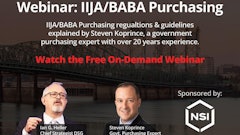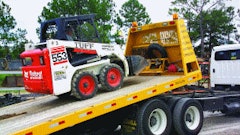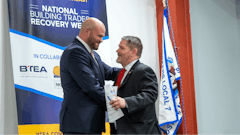
By now the construction industry has grown used to the often confusing stew of state and federal rules that guide how workers are classified for the purpose of determining tax, insurance, payroll and employee benefit obligations. In an era of persistent budget woes, the pressure from both levels of government to make companies comply with current regulations keeps ratcheting up.
States continue to vigorously enforce proper worker classification in part because significant state tax revenues are at stake. In similar fashion, misclassifying employees as independent contractors at the federal level has the effect of keeping substantial revenues out of the nation's coffers.
This misclassification may be totally unintended - some companies who believe they are doing all they can to comply with state standards for determining worker status may in fact be violating IRS rules without knowing it.
But a new program launched by the IRS may help fix the problem. The Voluntary Classification Settlement Program (VCSP) allows companies to prospectively reclassify workers as employees for employment tax purposes.
As an incentive for doing so, the program offers 90 percent amnesty on past due employment taxes for these workers and waves interest and penalties.
With such favorable terms, the program may be a good opportunity for construction firms to review their worker classification practices, clarify any gray areas and ensure that they are indeed complying with current IRS rules.
How the program works
Under the VCSP, a company pays only 10 percent of the amount of employment taxes on compensation paid for the most recent tax year to the workers being reclassified. In addition, the company will not be liable for any interest or penalties on that payment and will not be audited for employment tax purposes for prior years. Companies must apply to participate and enter into a closing agreement with the IRS.
The VCSP allows companies to reclassify either some or all of their workers. Once a company chooses to reclassify certain workers as employees, all workers in the same class must be treated as employees for employment tax purposes.
Here's an example: Acme Construction Co. currently contracts with its drywall installers, electricians and plumbers to perform services at housing construction sites. Management decides to voluntarily reclassify its drywall installers as employees. The company applies and is accepted into the VCSP and enters into a closing agreement with the IRS. Once the closing agreement is executed, Acme must treat all drywall installers as employees for employment tax purposes.
Determining eligibility
Companies that wish to voluntarily change the classification of their workers going forward and who meet certain requirements are eligible for the VCSP. Specifically, a company must be treating the workers as independent contractors and must have consistently treated the workers as non-employees, including having filed the required Forms 1099 with respect to each of the workers for the past three years.
In addition, the company cannot be currently under audit by the IRS and cannot be under audit by the Department of Labor or any state agency regarding the classification of the workers in question. A company that was previously audited by either agency concerning the classification of the workers may be eligible for the program so long as the company has complied with the results of the audit.
Application and acceptance process
In order to participate, an eligible company must complete and submit an application using IRS Form 8952. The application should be filed at least 60 days from the date the company wants to begin treating its workers as employees. No tax payment needs to accompany the application.
The IRS will then review the application and verify the company's eligibility. Once accepted, the IRS will contact the company (or its authorized representative) to enter into the VCSP closing agreement. The company must make full and complete payment of any amount due under the program when it returns the signed closing agreement to the IRS.
If the company is not eligible, the IRS will contact you to inform you that your application has not been accepted. This does not preclude you from applying at a later date, however.
Outcomes and obligations
The company must agree to treat the class or classes of workers as employees for future tax periods for employment tax purposes. It will not be subject to an employment tax audit with respect to the classification of the workers for prior years.
The company will pay 10 percent of the employment tax liability that may have been due on the compensation paid to the workers for the most recent year, with no liability for any interest or penalties. In addition, the company will extend the period of limitations on the assessment of employment taxes for the first, second and third calendar years beginning after the date the taxpayer has agreed to begin treating the workers as employees.
Confidentiality
Divulging information to the IRS about possible transgressions of the past is never easy. That is why the VCSP comes with a set of assurances in this regard. The IRS will not share information about applicants with the Department of Labor. Nor will it share information about participating companies with any state agencies.
If a company's application to the program is rejected, it will not automatically trigger the initiation of a federal audit. You could be audited for another reason, of course, but not as a result of the information contained on Form 8952.
It is also important to note that by signing the VCSP closing agreement, a company is not admitting any liability or wrong doing for past periods. The program concerns future years only. The IRS is not making any determination with regard to prior years, and you are not making any representation as to the workers' proper status for prior years as far as federal employment taxes are concerned.
Bill Rucci is a partner in the Boston area accounting and business advisory firm Rucci, Bardaro & Falzone PC, where he heads the firm's Construction Business Services Group. For a complimentary copy of "Employee vs. Independent Contractor: 7 Tips for Business Owners," contact Mr. Rucci at (781) 321-6065 or [email protected].


























